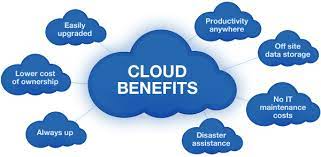The Benefits and Challenges of Adopting Cloud Computing in Your Business
Introduction to Cloud Computing
Welcome to the digital age, where technology is constantly evolving and transforming the way we do business. Quite possibly of the main headway as of late has been the ascent of distributed computing. This revolutionary concept has revolutionized how companies store and access data, collaborate with teams, and scale their operations.
Cloud computing offers numerous benefits that can help businesses thrive in today’s competitive landscape. From cost savings to improved scalability and enhanced accessibility, adopting cloud computing can be a game-changer for your organization. However, like any technological innovation, it also comes with its fair share of challenges.
In this blog post, we will explore both sides of the coin: the benefits that await those who embrace cloud computing wholeheartedly and the obstacles they may encounter along their journey. So fasten your seatbelts as we dive into this exciting world of cloud computing!
The Benefits of Adopting Cloud Computing

Cloud computing has revolutionized the way businesses operate, providing a wide range of benefits that can enhance efficiency and productivity. One of the most significant advantages is cost savings. By migrating to cloud-based systems, companies can eliminate the need for costly hardware infrastructure and reduce maintenance expenses. The pay-as-you-go pricing model allows organizations to scale their resources according to their needs, avoiding unnecessary expenditures.
Another benefit is scalability. Cloud computing enables businesses to easily adjust their storage capacity or computing power as demand fluctuates. This flexibility ensures that operations run smoothly during peak times without overburdening resources when they are not needed. Additionally, cloud solutions generally provide high availability and reliability due to redundancy across multiple servers, minimizing downtime and ensuring uninterrupted access.
Openness is one more key benefit presented by distributed computing. With data stored in the cloud, employees can access information from anywhere with an internet connection using various devices such as laptops or smartphones. This flexibility promotes remote work opportunities while improving collaboration among team members who may be located in different geographical locations.
Furthermore, adopting cloud computing allows businesses to leverage advanced technologies more easily through software-as-a-service (SaaS) or platform-as-a-service (PaaS) offerings. Rather than investing in developing custom applications or maintaining complex infrastructures internally, companies can utilize ready-made solutions hosted on the cloud platform.
While there are numerous benefits associated with adopting cloud computing, it’s essential to acknowledge some challenges that arise along the way as well – one being developing a robust backup strategy. Although data stored in the cloud is generally secure, unforeseen events such as outages or cyber attacks could potentially result in data loss if proper backup measures are not implemented.
In conclusion,
the adoption of cloud computing brings undeniable advantages like cost savings through reduced infrastructure costs and scalable resources tailored to business needs.
It also provides accessibility and flexibility by enabling remote work opportunities while promoting collaboration among teams.
However,
businesses must carefully consider challenges such as implementing a reliable backup strategy to ensure the security and integrity of their data in the cloud.
A. Cost Savings
One of the most significant benefits of adopting cloud computing in your business is the potential for cost savings. By utilizing cloud services, businesses can reduce their upfront costs and ongoing expenses associated with traditional IT infrastructure.
With cloud computing, there is no need to invest in expensive hardware or software installations. You can simply pay for the resources and services you need on a subscription basis. This eliminates the need for large capital expenditures and allows businesses to allocate their budget more efficiently.
Additionally, by moving to the cloud, businesses can reduce their operational costs. With traditional on-premises solutions, companies have to bear the burden of maintaining and managing their own servers and data centers. This requires hiring IT staff and investing in continuous maintenance activities. However, with cloud computing, all these responsibilities are taken care of by the service provider.
Furthermore, cloud computing offers scalability that enables businesses to scale up or down as needed without any additional hardware investment or downtime. This means you only pay for what you use at any given time instead of overprovisioning resources that may go unused.
Adopting cloud computing can result in significant cost savings for your business by eliminating upfront investments in hardware and software while reducing operational expenses related to maintenance and management.
B. Scalability
Scalability is one of the key benefits that cloud computing offers to businesses. With traditional on-premises IT infrastructure, organizations often face challenges when it comes to scaling up or down their resources based on demand. However, with cloud computing, this becomes a thing of the past.
In the cloud, businesses have the flexibility to easily adjust their resource capacity as needed. Whether you need more storage space for your data or additional computing power for processing tasks, scaling up can be done with just a few clicks. This allows businesses to quickly adapt to changing market conditions and customer demands without any hassle.
Moreover, scalability in the cloud is not limited by physical constraints like hardware limitations or server capacities. Cloud service providers offer virtually unlimited resources that can be provisioned instantly as per requirement. This means that whether your business experiences sudden spikes in traffic or needs additional resources for seasonal promotions, you can scale up without worrying about infrastructure limitations.
Additionally, scalability in the cloud also brings cost savings. Instead of investing upfront in expensive hardware and software licenses that may sit idle during periods of low demand, businesses only pay for what they use in the cloud. This pay-as-you-go model ensures optimal resource utilization and eliminates wasted costs associated with underutilized infrastructure.
Furthermore, scaling down resources is equally simple and efficient in the cloud environment. When demand decreases or projects are completed, businesses can easily reduce their resource allocation accordingly. This level of flexibility allows companies to avoid unnecessary expenses while still maintaining optimum performance levels.
Scalability is an invaluable advantage offered by cloud computing solutions that empower businesses to efficiently respond to changing needs and optimize resource usage while minimizing costs
C. Accessibility and Flexibility
In today’s fast-paced business world, accessibility and flexibility are crucial factors for success. What’s more, this is where distributed computing comes in! Adopting cloud computing brings a whole new level of convenience and freedom to your business operations.
Let’s talk about accessibility.With distributed computing, you can get to your information and applications from anyplace on the planet as long as you have a web association. No more being tied down to a specific office or location! This means that even if you’re on a business trip or working remotely, you can still collaborate with your team and stay connected with clients seamlessly.
The flexibility aspect of cloud computing is equally important. Cloud services offer scalable solutions tailored to meet the needs of your growing business. Whether it’s increasing storage capacity or adding new users, scaling up or down becomes effortless with just a few clicks. This eliminates the need for expensive hardware upgrades and allows you to adapt quickly to changing market demands.
Moreover, adopting cloud technology also provides flexibility in terms of software applications. Many cloud-based platforms offer integration options with popular third-party tools that enhance productivity and streamline workflows. Additionally, updates and patches are usually handled by the service provider automatically, ensuring that you always have access to the latest features without any hassle.
Embracing accessibility and flexibility through cloud computing opens up endless opportunities for businesses of all sizes. The ability to work anytime from anywhere while having scalability at your fingertips empowers organizations to be agile in today’s dynamic marketplace. So why wait? Start harnessing the power of the clouds now!
Challenges of Adopting Cloud Computing

Implementing cloud computing in your business can have numerous benefits, but it’s important to also consider the challenges that come with this transition. One of the main challenges businesses face when adopting cloud computing is data security. Entrusting sensitive information to a third-party provider may raise concerns about unauthorized access or data breaches.
Another challenge is vendor lock-in. Once you adopt a specific cloud service provider and migrate your applications and data to their platform, switching to another provider can be complex and costly. It’s crucial to carefully evaluate different providers and choose one that offers flexibility and scalability for future growth.
Furthermore, managing the migration process itself can be challenging. Moving existing systems and applications from traditional infrastructure to the cloud requires careful planning, coordination, and potential reconfiguration of software or hardware components.
Additionally, businesses must address compliance regulations when utilizing cloud services. Depending on the industry they operate in, there may be specific legal requirements regarding data storage location or encryption methods that need to be considered.
Ensuring reliable internet connectivity is essential for accessing cloud resources seamlessly. If an organization experiences poor network connectivity or downtime issues, it could significantly impact productivity and accessibility.
Overcoming these challenges requires thorough research, strategic planning, robust security measures,and proactive monitoring of performance metrics throughout the adoption process.
Share this post:

